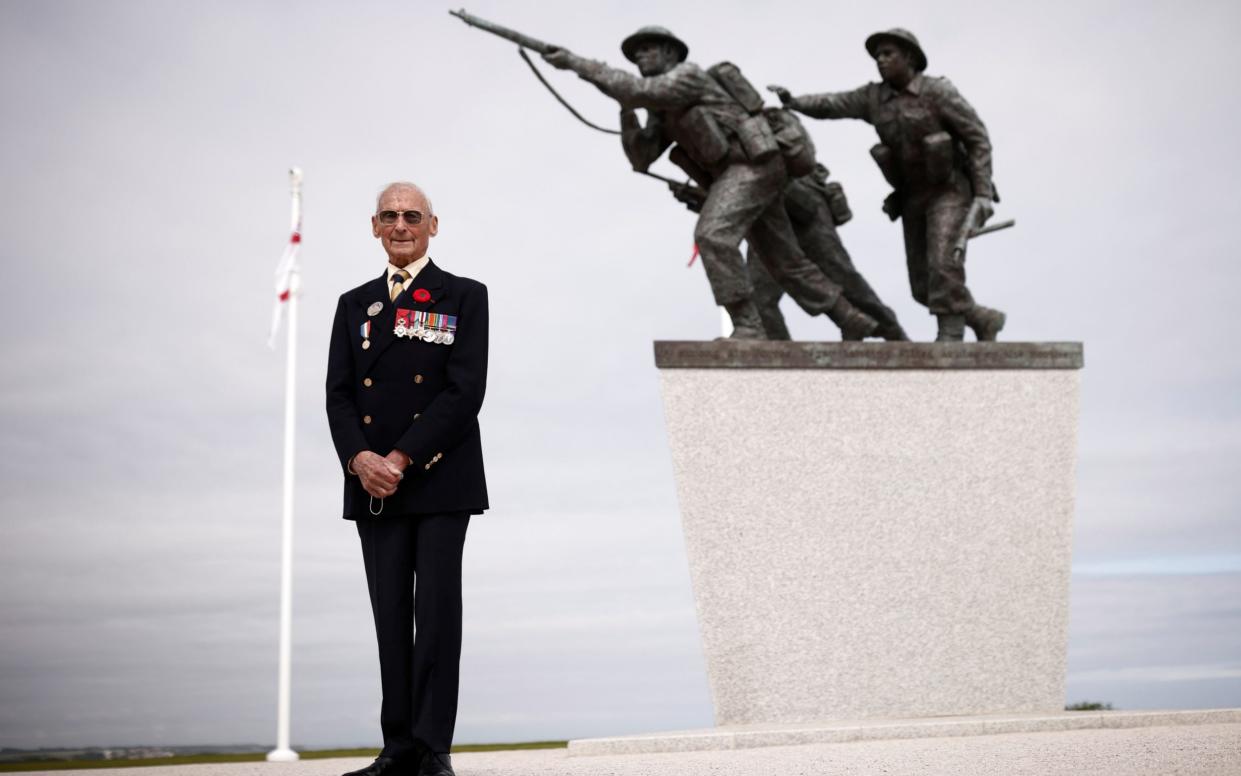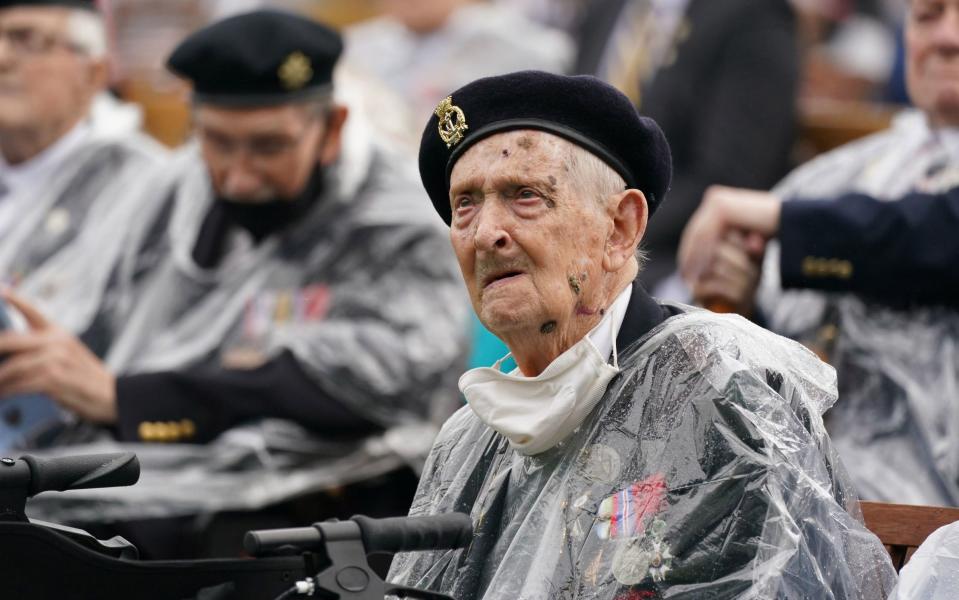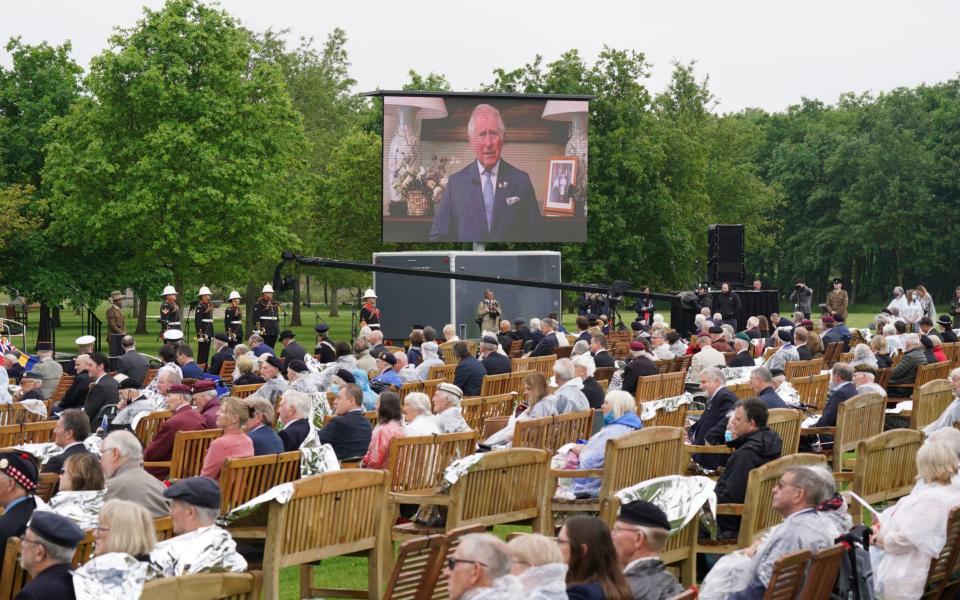Bittersweet day for D-Day veterans as Prince Charles leads tributes at opening of British Normandy Memorial

On June 6, 1944, they stormed ashore the beaches of Normandy, any thoughts of home long obscured by the thick smoke and screaming artillery shells.
On the 77th anniversary of D Day, the surviving veterans once more found themselves on the wrong side of the English Channel – this time prevented by Covid regulations from travelling to France to witness the official opening of the first dedicated memorial to all the British lives lost during the Normandy landings.
But this is a generation that does not accept defeat lightly.
Instead, more than 100 Normandy veterans gathered at the National Memorial Arboretum in Staffordshire to watch the opening of the memorial which they have campaigned for years to see, and upon which 22,442 names of the fallen are inscribed in the honeyed limestone.
The Prince of Wales gave a video address from Clarence House to the gathered band of veterans (the largest since the pandemic started).
“I know just how much our incomparable veterans had hoped to be in Normandy today to see their memorial for themselves,” said the prince, who is patron of the Normandy Memorial Trust, which has built the £30m memorial on a hillside overlooking Gold Beach.
“I can only hope that this serves to commemorate all those whose lives were lost.”
Among the veterans at the National Arboretum was George Batts, 95, who has campaigned for a dedicated memorial to British troops in Normandy for the best part of a decade.
“It is heartbreaking”, he said of being unable to attend in person. “But we will get out there soon. I’m going to keep taking my tablets until I do.”

Batts was an 18-year-old sapper with the Royal Engineers when he landed on Gold Beach on the morning of D Day. By then, the beaches were already strewn with bodies. “The main thing I remember is a smoky haze and the noise was just phenomenal”, he said.
Under perfect blue skies over Normandy’s beaches, the British ambassador to France, Lord Llewellyn, laid a poppy wreath at the foot of the memorial on behalf of the Prince of Wales, and the Red Arrows streaked in formation overhead. A Royal Navy off-shore patrol vessel, HMS Spey, observed the ceremony in the distance at sea.
Only one British veteran could attend in person, 97-year-old David Mylchreest. A second lieutenant with the 43rd Wessex Infantry Division who landed six days after D Day, he ended up being wounded at Arnhem, and these days lives in Normandy.
Mylchreest described being the sole veteran present as an “honour”, adding, “I look forward to the day that I can visit the memorial in the company of my fellow Normandy veterans and together pay tribute to our fallen comrades who made the ultimate sacrifice”.
In Staffordshire, meanwhile, a soft rain fell upon the assembled crowd, which included 170 descendants of the fallen named on the new memorial.
Among the veterans present was Ray Lord, 96, who on D Day was a private in the 2nd Battalion, East Yorkshire Regiment, when he landed on Sword Beach. He shed a tear as he watched the service.
After a short ceremony, the veterans formed a silent and solemn line. Some walked slowly aided by sticks, others were in wheelchairs and mobility scooters to lay a poppy wreath and salute.

Eric Strange, 97, was one of those to lay a wreath. On D Day, he was a young Naval sub-lieutenant transporting Royal Marines on to Sword Beach amid fierce shelling.
A Royal Marines Captain on the very next seat to him was struck and killed by a German shell. “He was unlucky and I was lucky,” he said. “And the memories stay with you for a very long time.”
Alongside the veterans, there were a few official dignitaries in attendance, including the veterans minister, Leo Docherty, and Lord Dannatt, retired chief of the general staff. Following the two-minute silence and laying of wreaths, nine veterans were presented with the Legion D’Honneur by French Rear Admiral Luc Pages.
On the 70th anniversary of D Day, France announced it would bestow its highest order of merit upon all surviving UK veterans involved in the liberation of the country from the Nazis.
Among those to receive the medal was Norman Rose, a 95-year-old Royal Marines Commando who landed on Gold Beach on the morning of D Day. A third of his unit were killed that day as they captured the town of Port-en-Bessin.
Among the casualties was a childhood friend who Rose had signed up to the Royal Marines with. He recalls holding his hand as he died.
“That was a terrible shock to me and I still remember it now,” he said.
After spending the best part of 18 months in lockdown and unable to meet up at various cancelled war commemoration events, for many of those in attendance it was a bittersweet day as the first occasion to catch up with old friends, as well as mourn the many who didn’t come home.
Among those savouring the taste of freedom was Roy Smith, 94, a private in the 4th Battalion, Dorset Regiment, in the Normandy landings, who was later captured and spent six months as a prisoner of war.
“I can’t remember the last time I came out to be honest,” he said of spending the past year in confinement.
“Getting out and talking to people, it keeps you alive.”

